
The advent of 5G technology opens up vast potential for various commercial and smart city applications such as smart surveillance, remote operation, telemedicine and intelligent transportation. With the ubiquitous availability of 5G in Hong Kong, mobile users are now enjoying vastly improved services with high speed, high capacity, high reliability, massive connectivity and low latency communications.
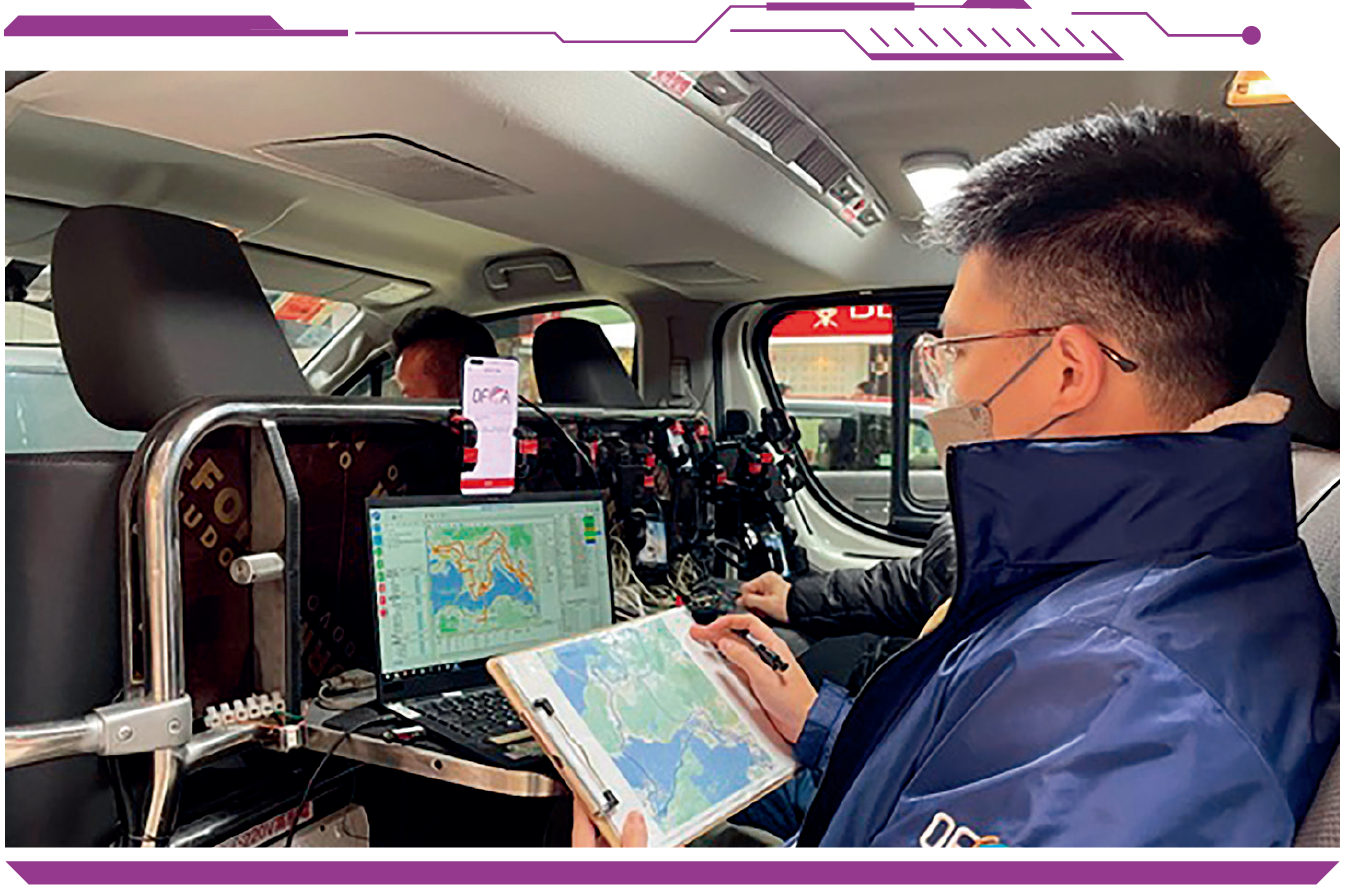
A staff member of OFCA conducting a field measurement on a mobile network operator’s network coverage for verification of its compliance with the licence requirements for 5G network and service rollout.
As of March 2023, the CA had assigned a total of 2 130 MHz of radio spectrum in various low, mid and high frequency bands, namely 700 MHz, 3.3 GHz, 3.5 GHz, 4.9 GHz, and 26 GHz and 28 GHz for public mobile telecommunications use, including the provision of 5G services. Commercial 5G services were launched in Hong Kong on 1 April 2020. As of March 2023, 5G coverage in Hong Kong reached over 90% and even up to 99% in core business districts, covering major locations in urban areas and all MTR lines.
In order to meet the growing needs of innovative 5G applications in terms of speed, capacity and coverage, OFCA supported the CA to release additional spectrum in different frequency bands to the market. In June 2022, OFCA assisted the CA in assigning 70 MHz of spectrum in the 700 MHz band to MNOs following an auction held in October 2021. OFCA will also assist the CA in making available 400 MHz of spectrum in the 6/7 GHz band to facilitate timely release of the spectrum to the market in early 2025.

Upon expiry of the current assignment in March 2024, 90 MHz of spectrum in the 2.5/2.6 GHz band will be re-assigned to three MNOs following an auction held in October 2021, resulting in some of the frequency assignments in the 2.5/2.6 GHz band that will be changing hands when the new 15-year term of assignments commences. OFCA convened a meeting of the technical working group comprising representatives of the three MNOs concerned in September 2022 to coordinate the relevant technical arrangements. OFCA will continue to ensure a seamless changeover at the time of re-assignment of the spectrum in the 2.5/2.6 GHz band in March 2024.

The current assignment of 20 MHz of spectrum in the 850/900 MHz band and 90 MHz of spectrum in the 2.3 GHz band will expire in May 2026 and March 2027 respectively. OFCA supported the CA and SCED to conduct a joint public consultation in November 2022 and issue a joint statement on 2 May 2023 on the re-assignment arrangements as well as the related SUF. Pursuant to the above decision, it is expected that the spectrum concerned will be re-assigned by way of auction in 2024.
The “Subsidy Scheme for Encouraging Early Deployment of 5G” under the Government’s Anti-epidemic Fund was well received with enthusiastic response when it was launched in May 2020. The Scheme aims to encourage early deployment of 5G technology across trades and industries for improving efficiency, productivity and quality of service. Under the Scheme, each approved project is subsidised with 50% of the actual cost directly related to the deployment of 5G technology, subject to a cap of HK$500,000. The total amount of funding earmarked for the Scheme is HK$100 million.
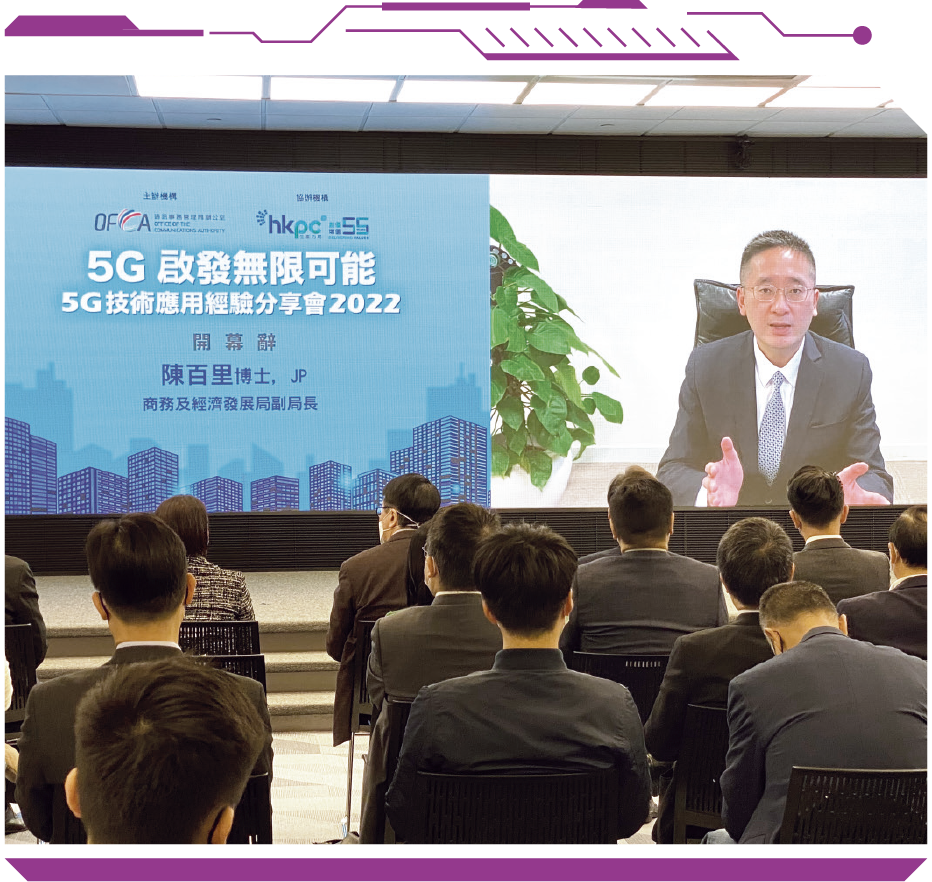
The officiating guest of the 5G seminar, the Under Secretary for Commerce and Economic Development, Dr Bernard CHAN gave an opening speech at the seminar.
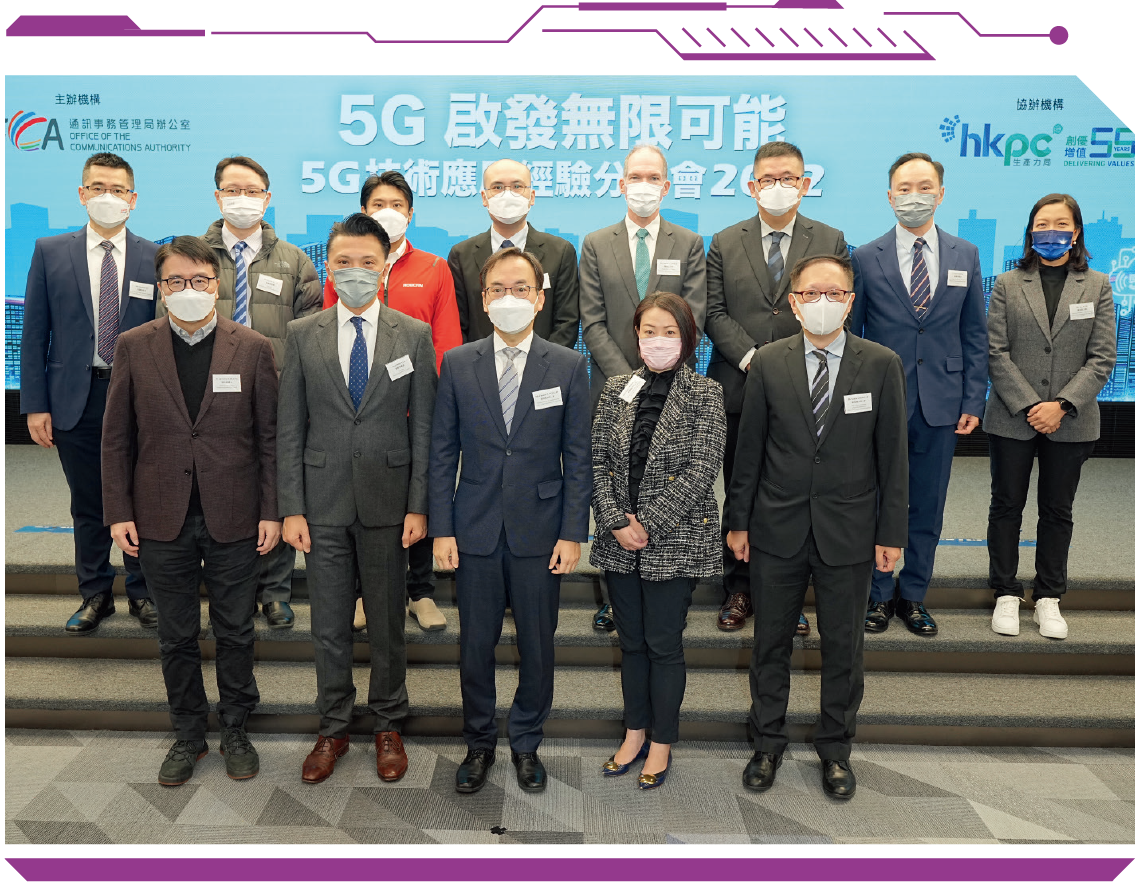
Group photo of OFCA staff and guest speakers at the 5G seminar.
As at its deadline for application on 31 December 2022, a total of 173 applications were approved, covering various sectors including agriculture, forestry and fishery, construction, design, education, environmental protection, e-sports and recreation, event and exhibition, finance and insurance, logistics, manufacturing, medical, healthcare and public health, professional services, property and building facilities management, repair, maintenance and monitoring, sales and marketing, telecommunications, textiles, and transport. Some prominent approved projects include remote surgery consultation and training system for university teaching hospital, STEM education system, safety monitoring system for construction site, smart passenger flow analysis system, smart security system, and remote control gantry crane, etc. The Scheme has successfully promoted early 5G deployments in a variety of sectors, facilitating smart city development, providing convenience for the public in their daily life while opening up more business opportunities and room for development for start-up businesses.
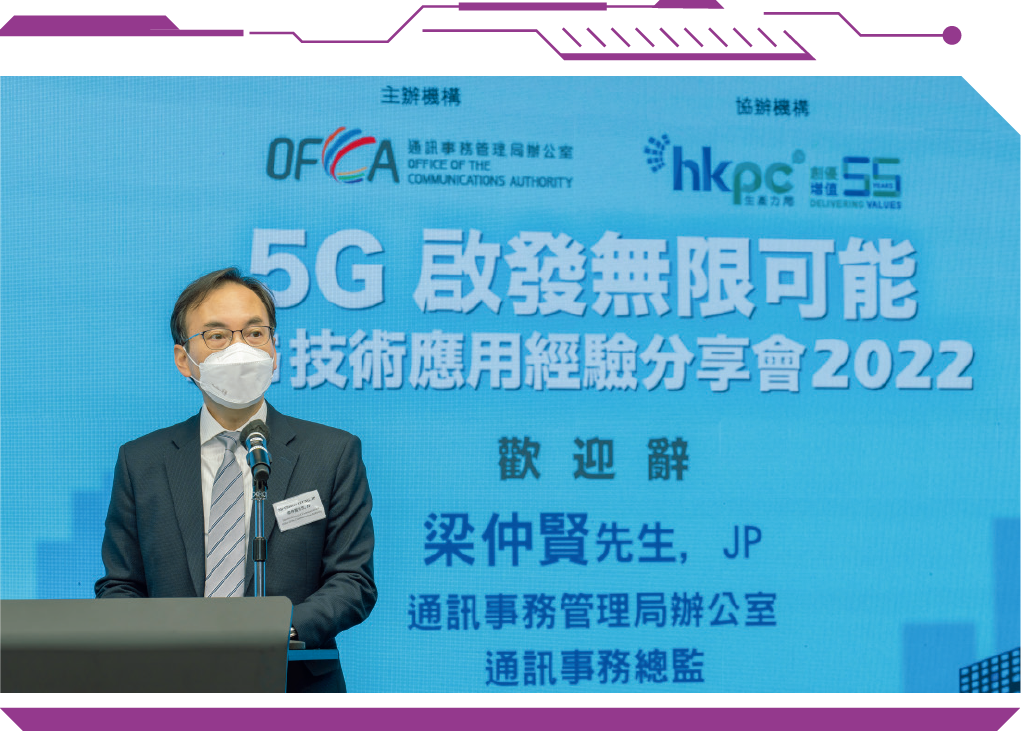
Director-General of Communications Mr Chaucer LEUNG, gave a welcome-speech at the 5G seminar.
In support of the Government’s policy initiative, OFCA is implementing a subsidy scheme with a funding of HK$770 million to provide financial incentives for FNOs to extend their fibre-based networks to 235 villages across nine districts in the New Territories and outlying islands. As these villages are located far away from the existing fibre-based backbone networks of FNOs, villagers could only choose broadband services delivered over copper-based networks at a speed of no more than 10 Mbps before the implementation of the Subsidy Scheme.
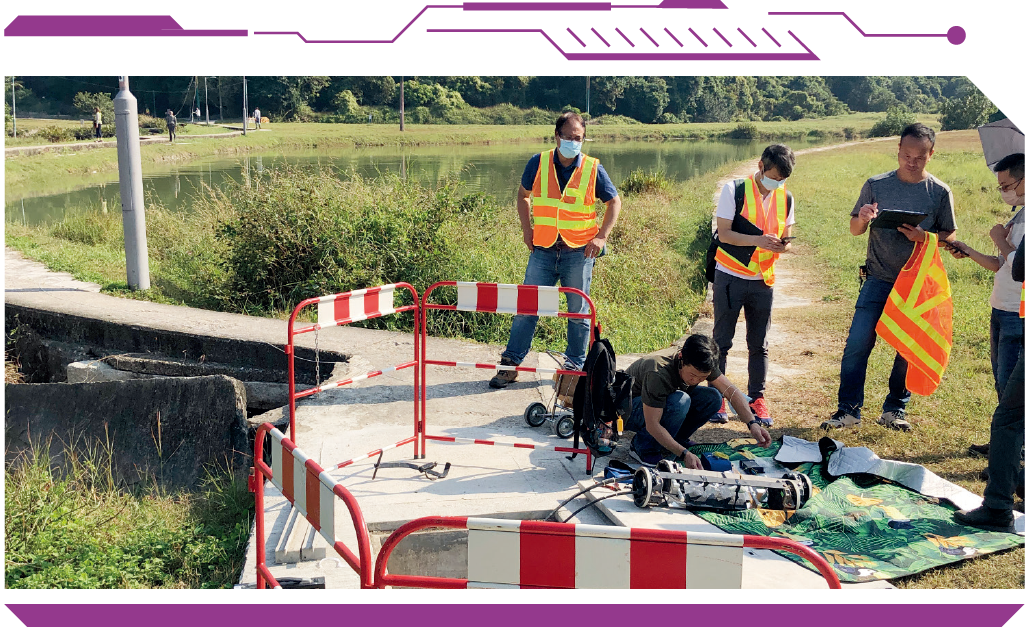
OFCA’s representatives carrying out an inspection on the installed facilities of fibre-based lead-in connections under the Subsidy Scheme.
The 235 villages are grouped under six projects (namely, Project 1 to Project 6) for tendering purpose. Selected FNOs are required to roll out fibre-based lead-in connections to the villages concerned, and roll out three submarine fibre-based cables connecting Lamma Island from Hong Kong Island (under Project 5), as well as connecting Cheung Chau from Lantau Island and Peng Chau from Lantau Island (under Project 6). To introduce competition, the selected FNOs are required to open up at least half of the capacity of the network facilities and submarine fibre-based cables subsidised under the Subsidy Scheme for use by other FNOs for free.
Following the award of all six tender projects under the Subsidy Scheme between November 2019 and May 2020, the selected FNOs have already extended their fibre-based networks to more than 120 villages and completed the rollout of three submarine fibre cables connecting Lamma Island, Cheung Chau and Peng Chau in May 2023. It is expected that fibre-based networks will be extended to all the villages covered by the Subsidy Scheme by 2026.
With the extension of the fibre-based networks, not only will the villagers concerned be able to enjoy high-speed fixed broadband services, MNOs will also be able to make use of the new networks as backhaul for their mobile networks and provide high-speed and innovative mobile services including 5G services to the areas concerned.

OFCA and mobile network operators conducting an on-site meeting with the representatives of a village to explore ways to improve its mobile coverage.
In support of the 2022 Policy Address initiative to strengthen 5G infrastructure, OFCA is assisting CEDB in formulating the legislative proposal to ensure availability of reserved space in and access to new buildings for installation of mobile communications facilities by MNOs. Consultation sessions with relevant industries (including the developers, telecommunications trade, professional bodies, etc.) were conducted to seek views from stakeholders on the proposal. Amendments will be made to section 14 of the TO to implement the initiative such that MNOs will be authorised to place and maintain radiocommunications installations at specified new buildings.
Meantime, OFCA will assist the CA in developing a Code of Practice for the Provision of Mobile Access Facilities in Specified Buildings for the Provision of Public Mobile Radiocommunications Services (Mobile CoP), which aims to provide practical guidance of requirements of the infrastructure for installation of mobile communications facilities in the specified new buildings to be followed by the developers and licensees prior to the construction of the buildings.
OFCA will continue to support CEDB to take forward the proposed legislative amendments, assist the CA in developing the Mobile CoP, and liaise with relevant parties to ensure timely implementation of the proposal to facilitate rollout of mobile networks.
Compared with older generations of mobile services, a larger amount of radio base stations (RBSs) are required for 5G. To facilitate the expedient and effective rollout of 5G networks, OFCA launched a pilot scheme in March 2019 to open up more than 1 000 suitable government premises for MNOs to install RBSs. OFCA has set up a dedicated team to coordinate with MNOs and relevant government departments to streamline the application process under the scheme. OFCA has accordingly issued the “Guidance Notes for Submission of Applications under the Pilot Scheme for Installation of Radio Base Stations at Selected Government Venues”, setting out the principles, requirements and streamlined procedures for application. As an incentive for MNOs, a nominal rental of HK$1 per year will be charged for each RBS installed. In January 2022, OFCA launched the second phase of the pilot scheme. Under the “demand-led” model, around 500 government premises have further been opened up for installation of RBSs. As of May 2023, 215 applications were received under the scheme, of which 113 were approved.
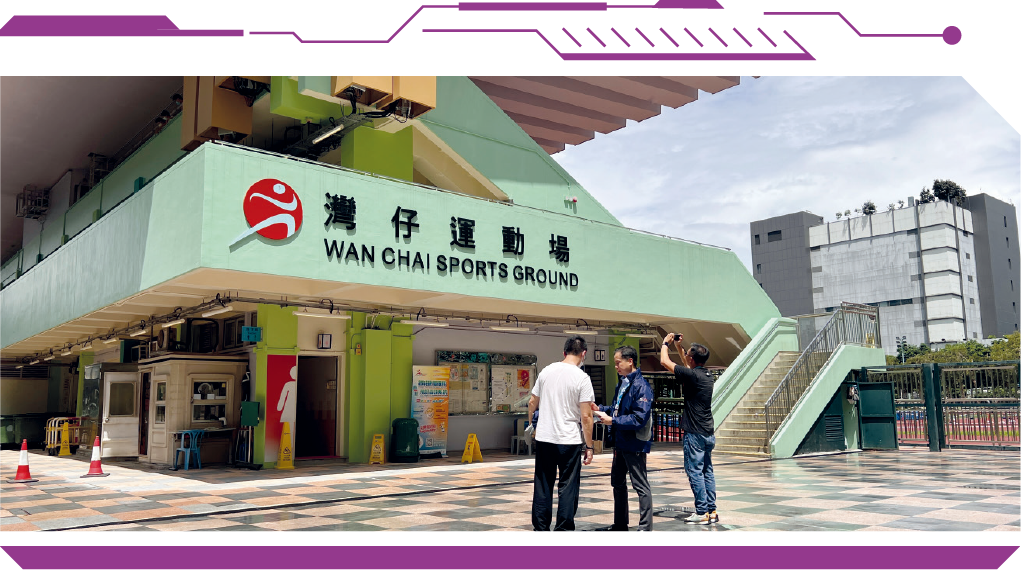
OFCA staff examining the installed radio base station at a government venue.
Apart from government premises, street furniture and public facilities such as public payphone kiosks and sheltered bus stops are also suitable for the installation of RBSs. To facilitate MNOs’ access to these facilities, OFCA issued the “Guidelines on the Use of Public Payphone Kiosks for the Installation of Radio Base Stations for Provision of Public Mobile Services” and “Guidelines on the Use of Sheltered Bus Stops for the Installation of Radio Base Stations for Provision of Public Mobile Services” in April and November 2020 respectively. As of March 2023, 10 applications for installation of RBS at sheltered bus stop were approved. OFCA will continue to work with the industry and relevant government departments in identifying suitable street furniture and public facilities for installation of RBSs and facilitating technical trials.
Following the reallocation of the 3.4 – 3.6 GHz (3.5 GHz) band from fixed satellite service to mobile service with effect from 1 April 2020, two restriction zones in Tai Po and Stanley have been delineated to enable the coexistence of 5G services and the earth stations for telemetry, tracking and control of the licensed satellites in orbit (TT&C stations) operating in the same and adjacent bands. In response to the industry request and with input from the stakeholders, OFCA assisted the CA in issuing the “Guidelines for Installation of Radio Base Stations Operating in the 3.4 – 3.6 GHz Band within the Restriction Zones Delineated by the Communications Authority” such that MNOs would be able to deploy 3.5 GHz RBSs within the restriction zones in a controlled manner. OFCA will continue to facilitate MNOs in the deployment of 3.5 GHz RBSs within the two restriction zones in accordance with the guidelines.
To resolve the issue of the “3.5 GHz restriction zone” in Tai Po, OFCA has proactively liaised with the concerned satellite operators regarding the relocation of their TT&C stations operating at the 3.5 GHz band from Tai Po to the Chung Hom Kok Teleport, so that MNOs can make wider use of all the available 5G bands (including the 3.5 GHz band) in Hong Kong for the provision of 5G services. With OFCA’s assistance, one satellite operator has been granted a land lot for relocation of its TT&C stations from Tai Po to the Chung Hom Kok Teleport, while another operator has undertaken to install satellite band-pass filters at its satellite facilities to prevent radio interference.

Relocation of the TT&C stations involves complex land and technical issues, including site selection, land grants, site formation, construction work and establishment of additional satellite antennae as well as ensuring that operation of the existing satellites in orbit will not be affected. Considering the lead time and effort required for completing the relocation exercise, it is expected that the “3.5 GHz restriction zone” in Tai Po can be removed before the end of 2024. In the meantime, MNOs are making use of other 5G bands (e.g. the 700 MHz and 4.9 GHz bands) or have re-farmed their existing spectrum (e.g. the 850 MHz and 2.1 GHz bands) to provide 5G services in the “3.5 GHz restriction zones” in Tai Po.
OFCA keeps up with worldwide development trends in telecommunications and participates in related international/regional meetings of the International Telecommunication Union (ITU), Asia-Pacific Telecommunity (APT), and other organisations. Through various formal and informal channels, OFCA also maintains dialogue with the industry players in Hong Kong to keep abreast of the development of the telecommunications industry. An in-house task force on spectrum supply has been set up in OFCA to collate efforts with a view to conducting early spectrum planning work and ensuring timely release of suitable spectrum to meet the demands of emerging new radiocommunications services and facilitate the ongoing development of public mobile (including 5G) services. Taking into account OFCA’s recommendations, the CA issued the Spectrum Release Plan for 2023–2025 in February 2023 to inform the industry of the potential supply of spectrum for provision of public mobile and/or other radiocommunications services in the coming three years. In addition, OFCA will keep abreast of the outcomes of the World Radiocommunication Conference to be convened in late 2023 on the identification of new frequency bands for mobile services. Taking note of the market development, OFCA will assist the CA in making available suitable new spectrum to the industry.
The Telecommunications (Amendment) Ordinance 2021 (Amendment Ordinance) came into operation on 24 June 2022 to implement four major measures, namely stipulating the powers of the CA on regulating the telecommunications functions of smart devices, strengthening the protection of underground telecommunications infrastructure, simplifying the licensing framework to facilitate the introduction of innovative services and improving the appeal mechanism under the TO.
Under section 18A of the TO, it is a criminal offence for any person who failed to take reasonable steps to protect or prevent damage to an underground telecommunications line when carrying out any work below ground level near the line. In this regard, OFCA assisted the CA in compilation and issue of the “Guidelines on Work near Underground Telecommunications Lines” (the Guidelines) to provide relevant stakeholders with practical guidance for compliance with section 18A. According to the Guidelines, the working party shall appoint a competent person to carry out detection work for the underground telecommunications lines. In this connection, OFCA has liaised with two training course providers, namely the Hong Kong Institute of Construction and the Hong Kong Institute of Vocational Education, to offer relevant training courses. So far, more than 600 persons have attended the training courses provided by the two training institutions and over 290 of them have been registered as competent persons. The list of competent persons is published on OFCA’s website. After just over a year of implementing section 18A of the TO, four successful prosecution cases were brought with fines ordered by the Magistrates, and five cases are under investigation or prosecution. It is anticipated that the enforcement work will raise the industry awareness on the protection of underground telecommunications infrastructure.
An emergency alert system (EAS) has been set up by the four local MNOs to enable the Government to send time-critical messages via their mobile networks to alert the public to take contingency measures as soon as possible during emergency situations, such as unforeseen extreme weather conditions, earthquakes, etc. OFCA will continue to work with MNOs in streamlining the operation and assist different bureaux/departments in disseminating emergency messages via the EAS as necessary.
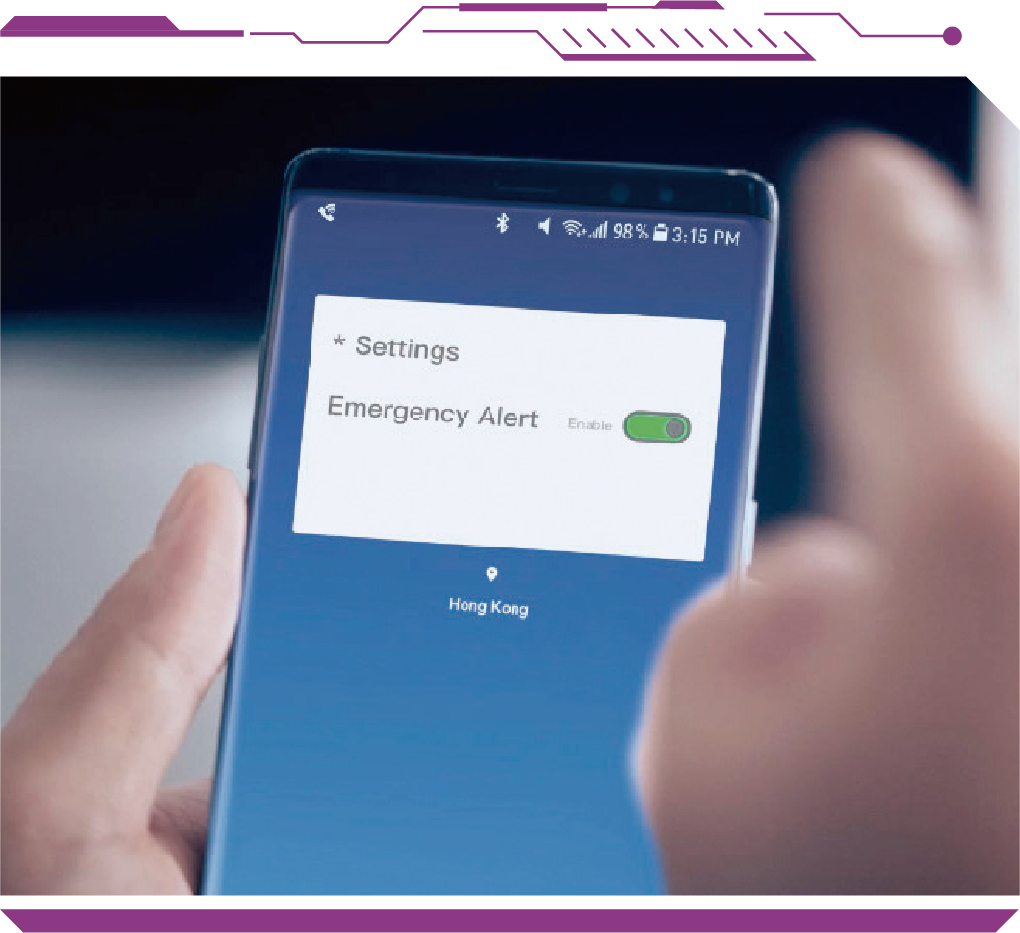
Under the Telecommunications (Registration of SIM Cards) Regulation (Cap. 106AI), the Real-name Registration Programme for SIM Cards (RNR Programme) requires existing PPS card users to complete real-name registration by 23 February 2023 or their PPS cards would be deactivated. After the aforementioned statutory deadline, all SIM cards issued and used locally (including SIM service plans and PPS cards) must complete real-name registration before service activation.
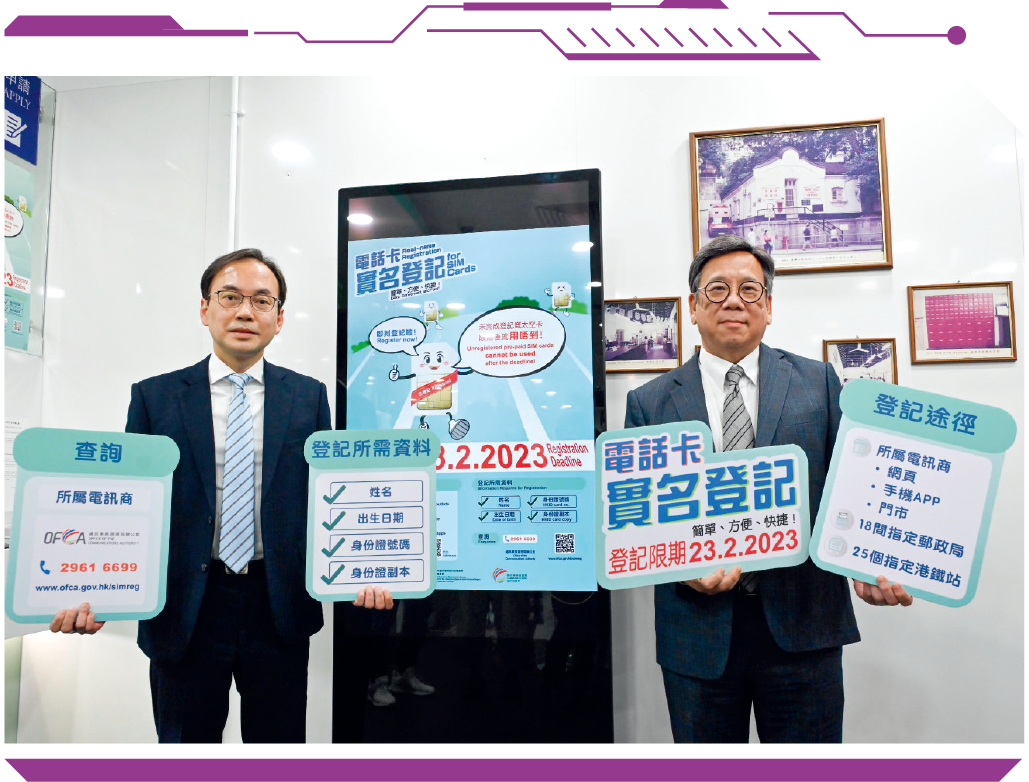
The Secretary for Commerce and Economic Development, Mr Algernon YAU (right), accompanied by the Director-General of Communications, Mr Chaucer LEUNG (left), visited Wan Chai Post Office on 16 February 2023 to view the operation of the support service for Real-name Registration for SIM Cards and appealed to users to complete the registration as soon as possible before the deadline on 23 February 2023.
To assist members of the public, particularly the elderly and other needy groups, in completing registration for their PPS cards before the aforementioned statutory deadline, OFCA set up service counters for real-name registration at 18 designated post offices and 25 designated MTR stations. OFCA also collaborated with various social welfare organisations to provide assistance to those in need. Trainings for volunteers from more than 200 social welfare agencies and district organisations were arranged and more than 25 visits to elderly centres and residential care homes for the elderly were conducted to assist their clients in completing registration on the spot. OFCA also participated in home visits and outreach activities with these organisations. To further enhance public awareness on the need for timely registration, OFCA has rolled out a comprehensive publicity efforts through various media and channels to remind the public of the need to complete the registration for their PPS cards before the deadline.
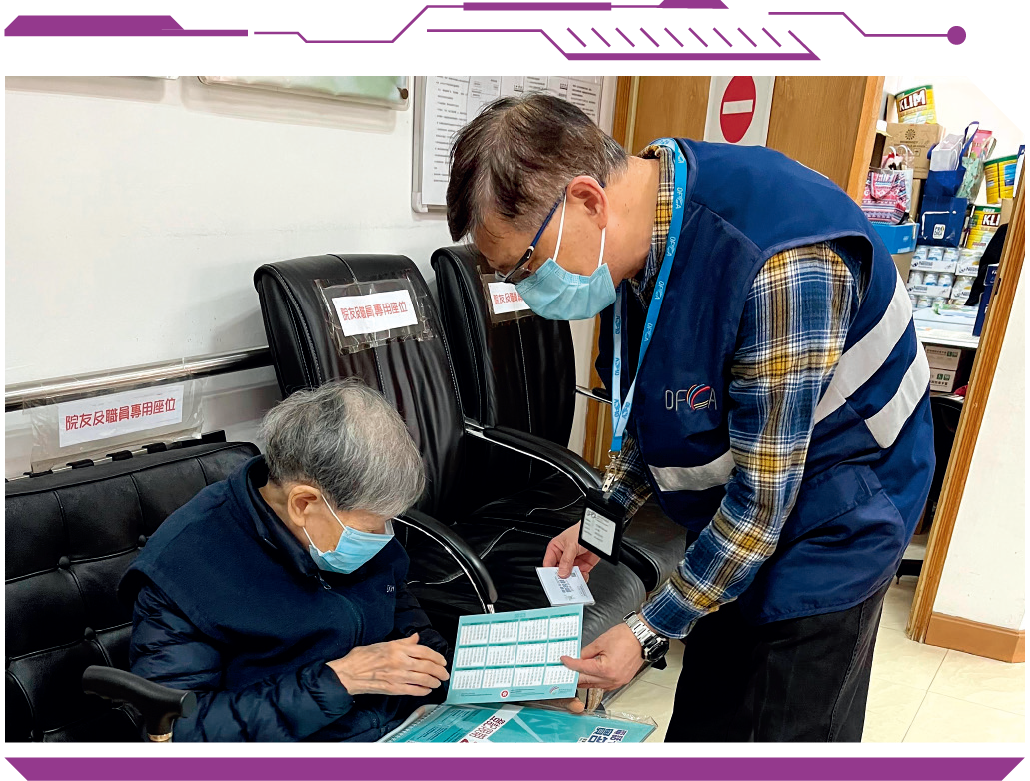
A staff member of OFCA delivering publicity items and explaining to an elderly person about the Real-name Registration for SIM Cards during a visit to a residential care home for the elderly.
The RNR Programme was fully implemented on 24 February 2023 and the operation of the entire process had been smooth in general. As of 31 March 2023, about 13 million SIM cards (including SIM service plans and PPS cards) had already completed registration.
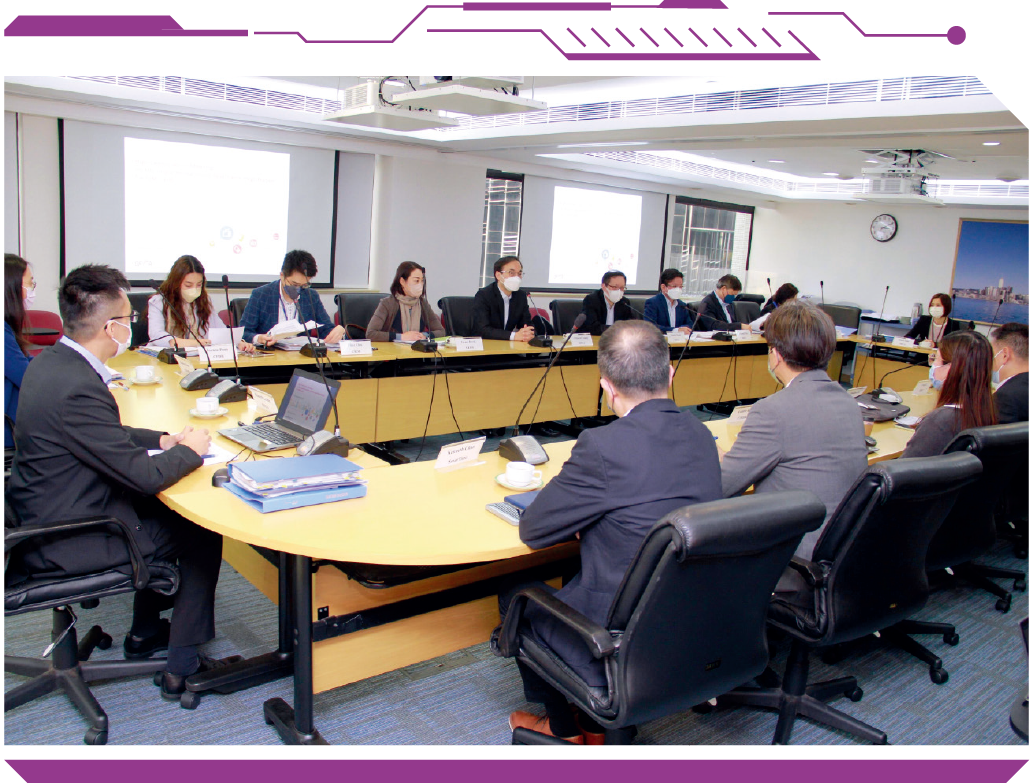
The dedicated task force for the Real-name Registration for SIM Cards formed by the Government and telecommunications service providers held meetings in February 2023 to discuss various plans to facilitate the proper handling of various contingency situations that may arise before and after the registration deadline.
OFCA has been carrying out a series of ongoing monitoring and enforcement actions to ensure the effective implementation of the RNR Programme. In particular, OFCA has assisted the CA to issue guidelines (the Guidelines) to provide specific operational details and requirements of the RNR Programme for telecommunications service providers. The Guidelines has mandated that the telecommunications service providers should adopt different measures to verify information of the users, including face-to-face registration, making use of optical character recognition to automatically extract information from identity documents, manual visual checking of information, etc., so as to effectively verify identity documents of users and to ensure that the registration systems comply with the requirements of the Registration Regulation and the Guidelines. In May 2022, an investigation was conducted by OFCA regarding a suspected non-compliance case by a telecommunications service provider for failing to ensure completion of real-name registration by its subscribers before service activation. The CA, having considered OFCA’s assessment and the telecommunications service provider’s representations, issued a direction to it on 21 October 2022 for rectifying its breach of the Registration Regulation.
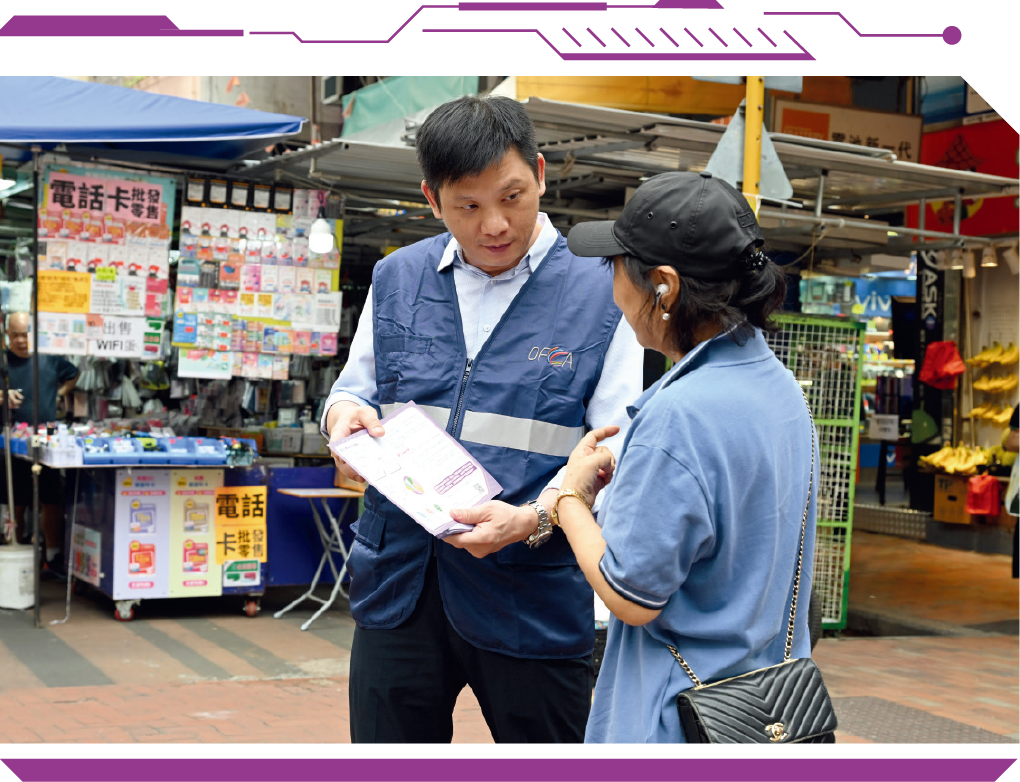
OFCA conducts a market surveillance in Sham Shui Po District to ensure effective implementation and enhance public awareness of the Real-name Registration for SIM Cards.
OFCA will continue to work with telecommunications service providers to enhance the registration platforms taking into account the operational experiences since the implementation of the RNR Programme, and to conduct regular sample checks on the registration information to safeguard the integrity of the registration records. OFCA will also keep on carrying out enforcement and monitoring actions, including verification of telecommunications service providers’ registration platforms, market surveillances and regular inspections of the registration records.
OFCA has been working closely with the telecommunications industry and law enforcement agencies to devise and implement technical measures against fraudulent calls and messages delivered through telecommunications networks. In September 2022, OFCA, the Police and the telecommunications industry set up a Working Group on Tackling Fraudulent Calls and Messages by the Telecommunications Industry (the Working Group) to further coordinate efforts to combat fraudulent calls and messages from the telecommunications perspective. To provide a clear licensing and regulatory framework for the implementation of the relevant measures to tackle fraudulent calls and messages, OFCA assisted the CA in introducing a new licence condition and made amendments to relevant regulatory instruments to set out express provisions for the purpose.
Through the concerted effort of the members of the Working Group, the telecommunications industry has introduced a number of new measures successively since the fourth quarter of 2022, including (a) sending voice or text alert for calls with caller number prefixed with “+852” to alert mobile service users that the calls are from outside Hong Kong, (b) blocking transmission or delivery of calls bearing suspicious or spoofed caller identity, and (c) blocking access to suspicious websites and suspending telecommunications services of local phone numbers involved in scam cases based on information provided by the Police. OFCA will continue to work with the telecommunications industry and the Police to enhance the effectiveness of the measures.
To help the public verify the authenticity of SMS senders, OFCA is working with the telecommunications industry, the banking industry and the Police to establish a registration scheme for SMS senders which is targeted to be launched before the end of 2023.
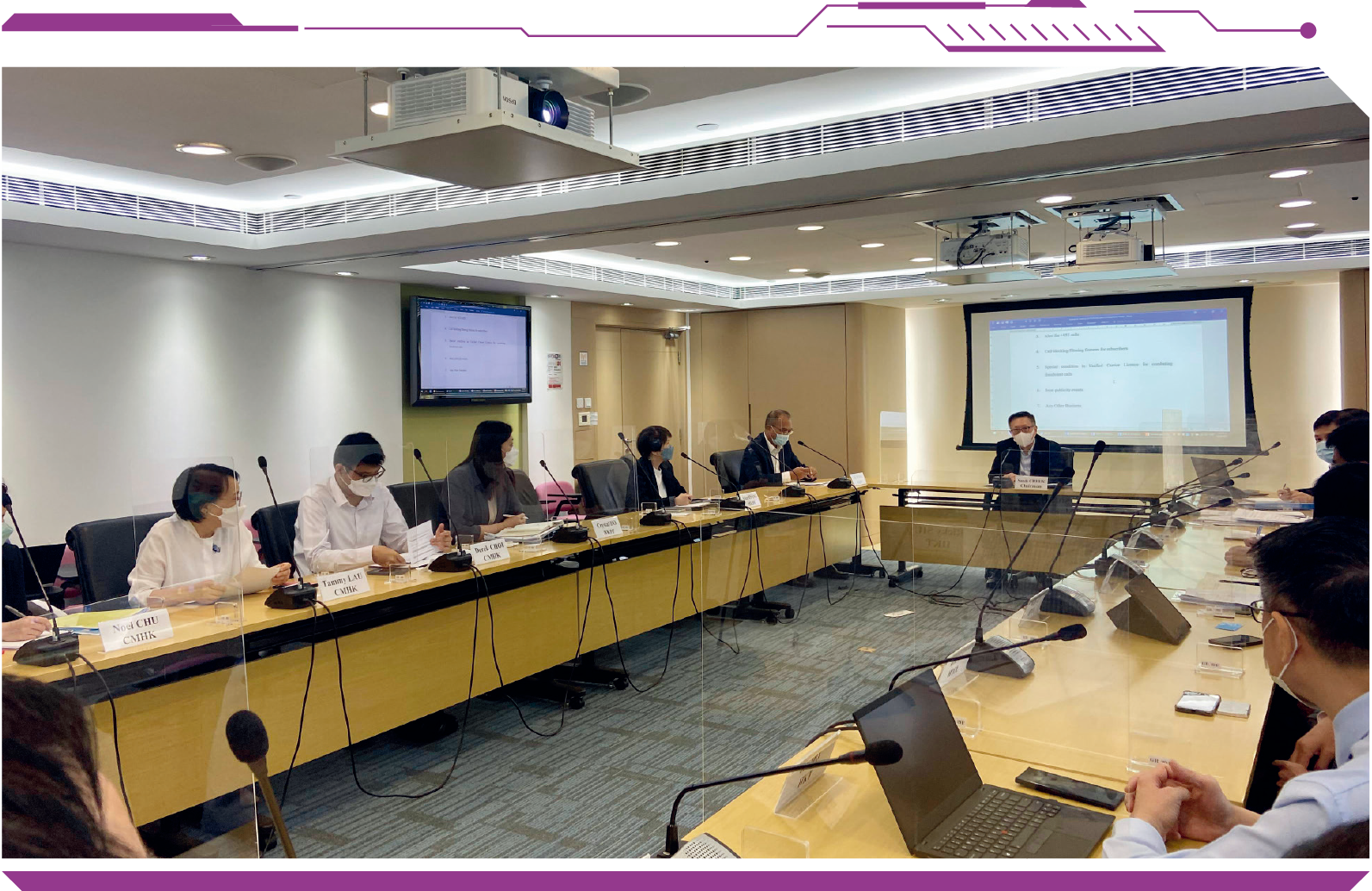
OFCA collaborates with the telecommunications industry and law enforcement agency on developing effective measures to combat fraudulent calls and messages as well as to strengthen public education in this regard.
At the same time, OFCA assisted the CA in the issue of a Code of Practice on Management of Scam Calls by Mobile Service Providers on 21 April 2023. Under the code of practice, mobile service providers are required to monitor calls originating from their networks and systems and prevent the use of individual local telephone numbers/codes from generation of scam calls. They are required to take appropriate actions to suspend the relevant telecommunications services/functions of any local telephone numbers/codes that are identified as generating suspected scam calls. The code of practice came into operation on 30 June 2023. From July to August 2023, mobile service providers have suspended the telecommunications services of about 200,000 local telephone numbers in accordance with the code of practice.
With the advent of technology, there are emerging new Wireless Local Area Network (WLAN) devices operating in the 5925 – 6425 MHz band (such as the commonly known Wi-Fi 6E devices, collectively referred to as “6 GHz devices”) which support better performance in terms of faster data rates and lower latency. To enable the introduction of these 6 GHz devices into Hong Kong, OFCA assisted the CA in creating the class licence for regulating the use of and trade in 6 GHz devices, and varying the existing class licence for the provision of public WLAN services in April 2022.
Following the creation and variation of these class licences, 6 GHz devices (including access points and client devices) are now widely available in Hong Kong, and the use of these devices allows the public to enjoy high performance WLAN services in both private and public locations. OFCA has introduced a dedicated page on its website providing advice to consumers on making informed choice of 6 GHz devices. In addition, information leaflets are made available to remind the industry on the labelling requirement for 6 GHz access points offered for sale in Hong Kong under the class licence for 6 GHz devices.
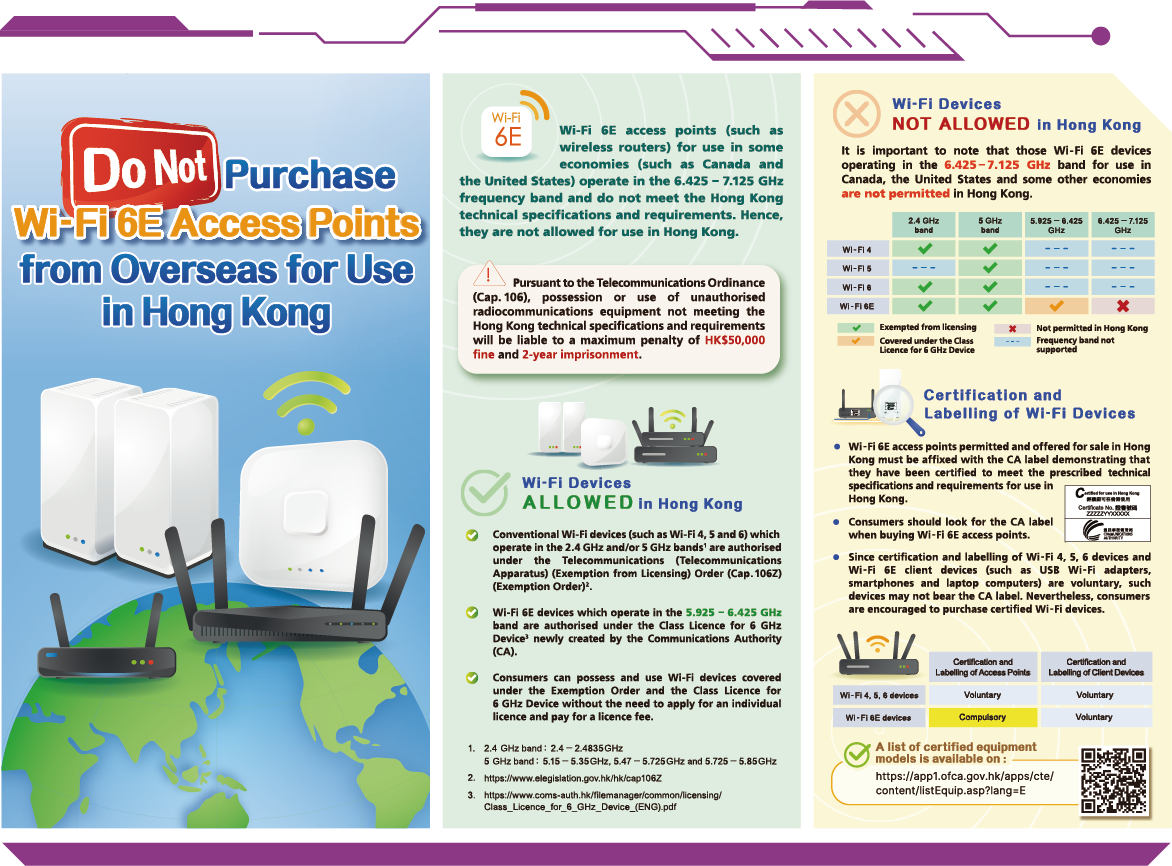
OFCA distributes leaflets to provide advice to consumers on how to select 6 GHz devices.
OFCA processed an application from SmarTone Mobile Communications Limited (SmarTone) seeking the CA’s approval to cease its provision of 2G services by October 2022. Under the relevant licence conditions, MNOs are required to make proper and appropriate arrangements for the affected customers to the satisfaction of the CA before ceasing to provide a generation of mobile service. With OFCA’s assistance in vetting the application, the CA has granted consent to SmarTone in August 2022, having taken into account relevant considerations including that no 2G service plans were provided by SmarTone to any customers; the extremely low percentage of affected customers who were still using 2G handsets/devices for connection to SmarTone’s network; incentive offers provided by SmarTone to the affected customers to upgrade their 2G handsets/devices; favourable termination arrangements for those who chose not to upgrade their 2G handsets/devices; and sufficient time of notification and customer support to the affected customers. SmarTone ceased the provision of all its 2G services from 14 October 2022.
With the support of OFCA and other government departments, PCCW-HKT Telephone Limited and Hong Kong Telecommunications (HKT) Limited (HKT), a major operator of public payphone service, commenced in March 2023 a trial of smart payphone kiosk (Smart Kiosk) with the aim of revitalising traditional kiosk-type public payphones. HKT installed two trial Smart Kiosks in Causeway Bay and Central in April and May 2023 respectively. Apart from providing public payphone and free Wi-Fi services, the Smart Kiosks are equipped with multiple functions and information services such as body temperature checking, availability of transportation services, public facilities and services of non-government organisations in the vicinity, as well as news and weather information provided to the public free-of-charge. HKT will review the responses and feedback from the public after the trial period. OFCA will continue to provide coordination support to HKT.
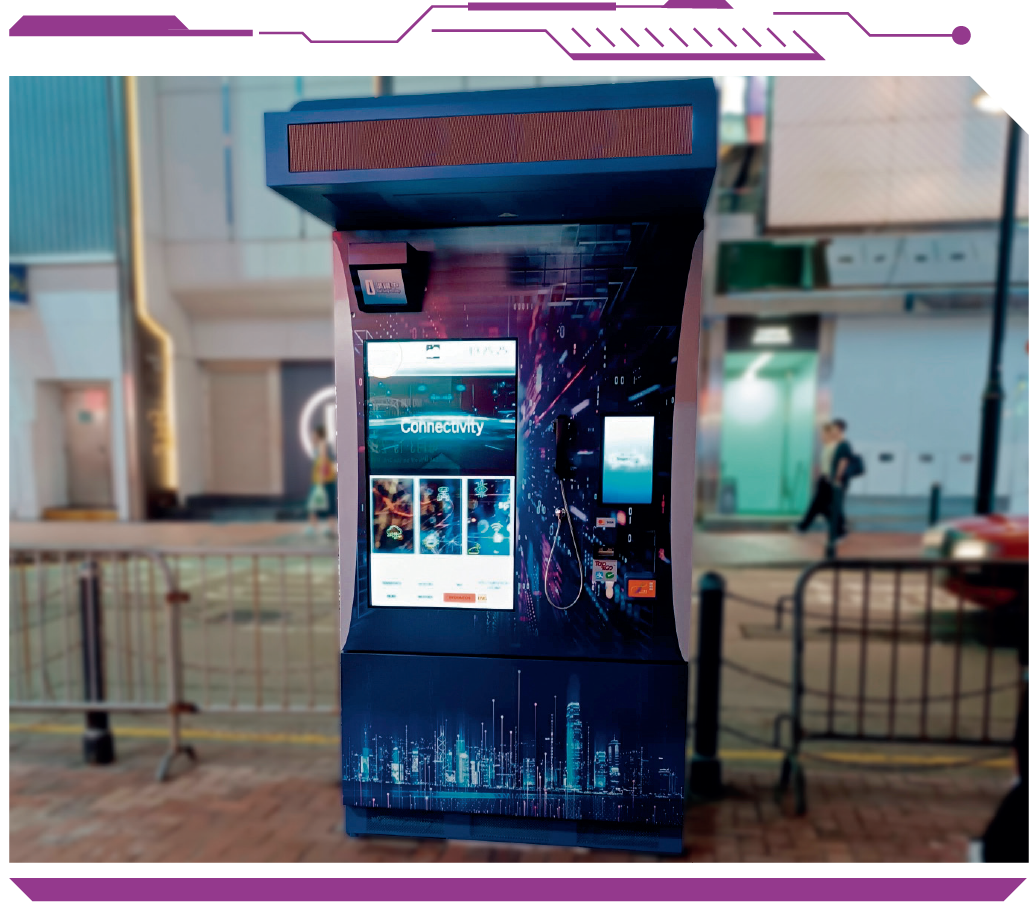
In April 2023, a Smart Kiosk was installed for trial in Causeway Bay.
With the continual network expansion of FNOs, Hong Kong now enjoys an extraordinarily high penetration of broadband services. As of March 2023, there were around 3 million residential and commercial fixed-broadband subscriptions, with household penetration rate reaching over 99%, among which 85% of the households are enjoying fixed-broadband services via optical fibre.
According to a report issued by the Fibre to the Home Council Europe in April 2023, among the 86 economies under comparison, Hong Kong ranked fourth worldwide in fibre to the home/building household penetration.
To promote the awareness of the public including building owners and building management offices (BMOs) on the merits of having optical fibre networks in their buildings, OFCA launched a labelling scheme for buildings with optical fibre access and the associated publicity activities were kicked off in November 2022. Under the scheme, OFCA compiles and maintains a register of buildings connected with optical fibre networks based on information provided by FNOs as well as building owners, BMOs and property developers. The register, in the form of a geographical information system, is open to public inspection on OFCA’s website. The relevant building owners or BMOs are encouraged to display the designated label at their buildings indicating that the buildings have access to optical fibre networks. As of March 2023, more than 67 000 buildings were registered under the scheme, covering over 90% of living quarters.


OFCA launched TV Announcement in Public Interest (API) to promote the new labelling scheme for buildings with optical fibre access.
With the support of OFCA’s single-point-of-contact service, several new regional or transcontinental submarine cable systems as well as four domestic systems are under construction and scheduled to be put into service between 2023 and 2026. OFCA will continue to assist operators in applying for the necessary statutory approvals for the construction and landing of new submarine cable systems in Hong Kong.
In order to reinforce Hong Kong’s role as a regional telecommunications hub and meet the growing demand for external telecommunications facilities, OFCA has been working with relevant bureaux and departments to make available suitable land lots in the Chung Hom Kok Teleport for external telecommunications infrastructure, so as to further enhance the overall capacity and diversity of Hong Kong’s external telecommunications networks. Following the tender exercises conducted by LandsD, two land lots at the Chung Hom Kok Teleport were awarded to successful tenderers in August 2022 and March 2023 respectively.
The land leases of 42 sites granted to telecommunications operators for establishing and operating telephone exchanges and other telecommunications-related facilities will expire in 2025. To facilitate the Government’s consideration of the way forward for handling these sites upon lease expiry, OFCA will continue to provide support and advice to the Government on the issue from the telecommunications perspective.
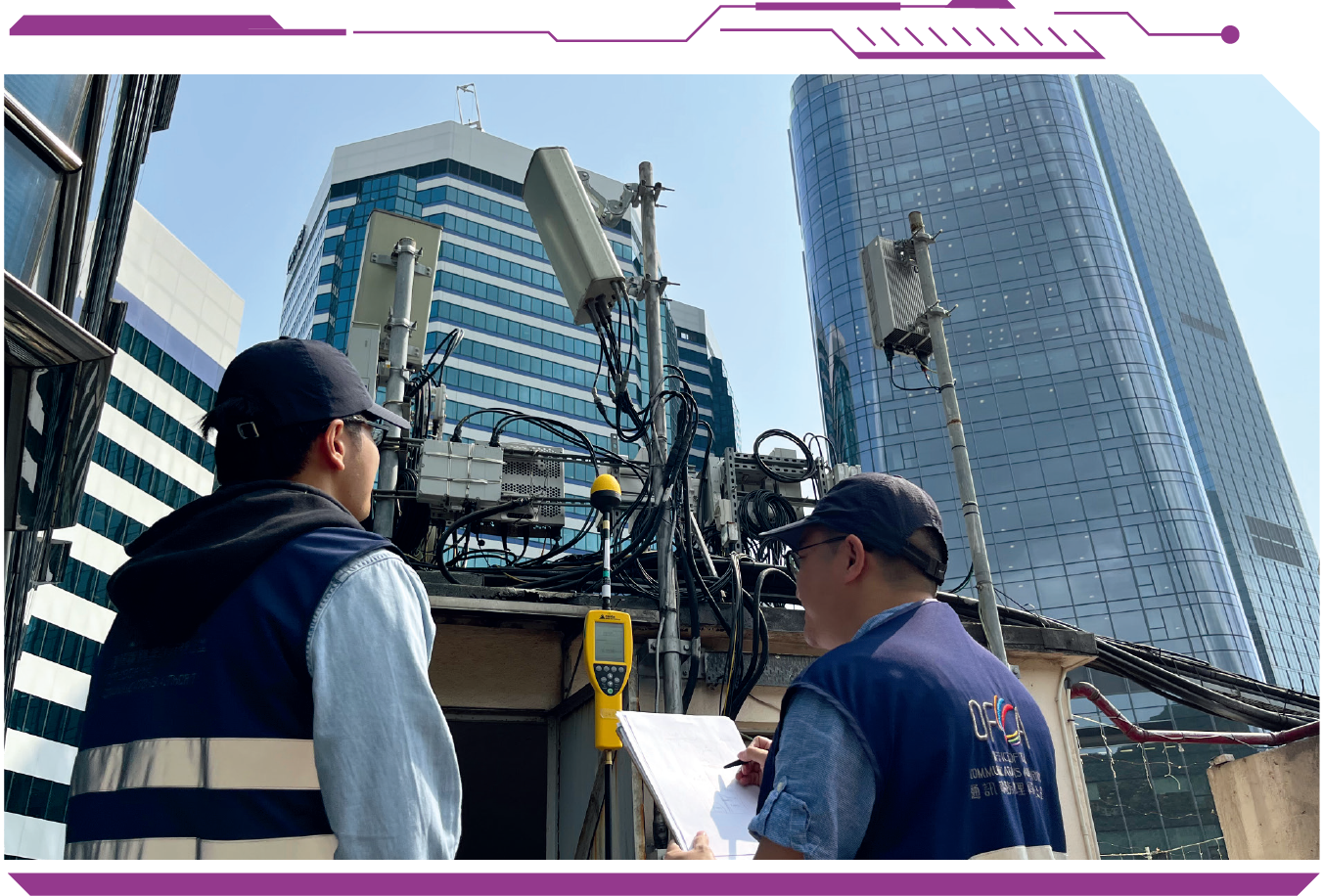
OFCA conducts sample checks on the radiation levels of approved radio base stations from time to time to safeguard public health.
In April 2021, OFCA conducted a technical consultancy study on non-ionising radiation (NIR) safety of RBSs, including 5G RBSs. The study was completed in June 2022 and the consultancy report was published on OFCA’s website in August 2022. The study examined technical matters in relation to NIR, in particular those for 5G RBSs employing new technology like massive multiple-input-multiple-output antennas, reviewed the methodology for assessment of NIR for different RBS deployment scenarios and the existing regulatory measures, and made recommendations on practical measures to control the radiation safety of RBSs. Having considered the findings and recommendations of the study, the CA has updated the conditions for approval of RBSs under different scenarios so as to facilitate the on-going development of public mobile services while safeguarding public health.
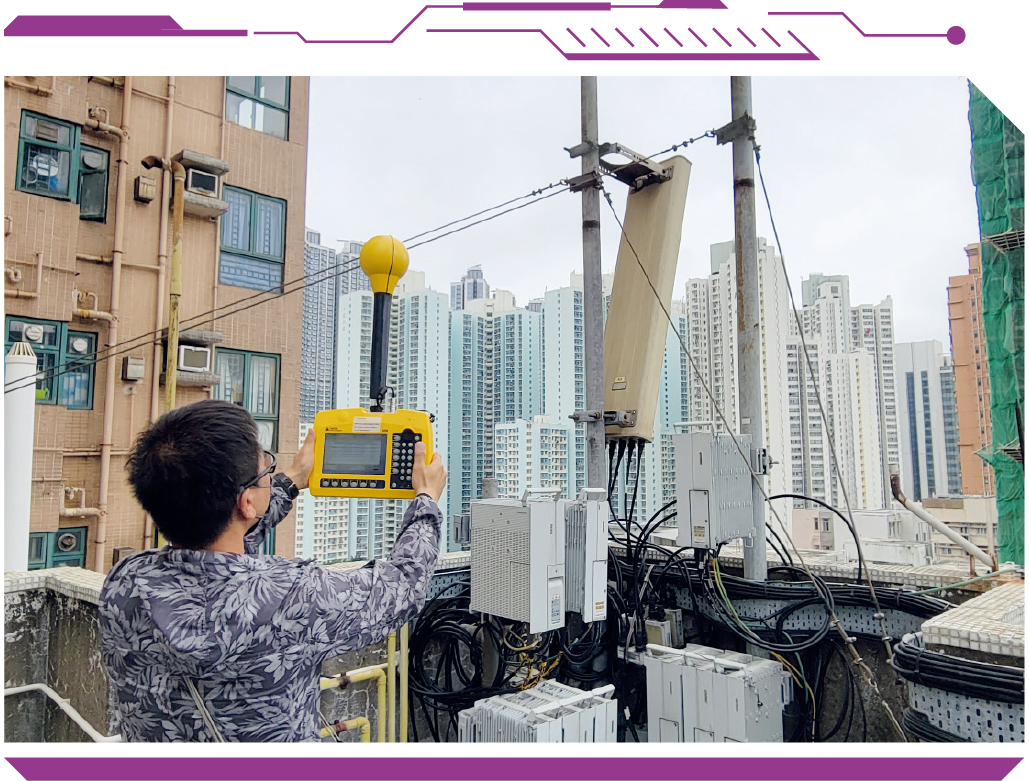
To ensure effective support for 5G network, radio base stations must comply with safety standards.
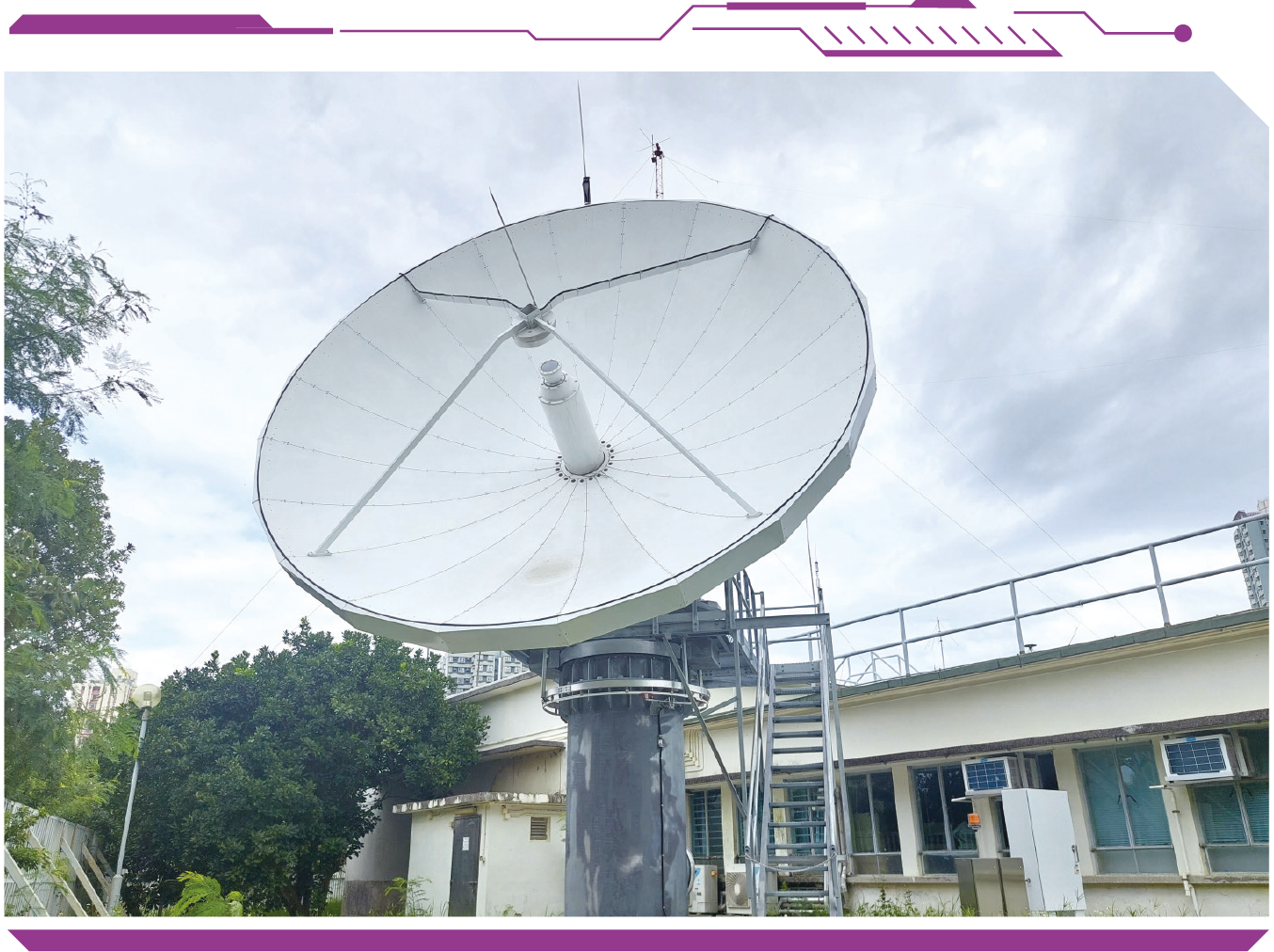
The new Satellite Broadcast Monitoring System located at the Ngau Tau Kok Service Reservoir was put into operation on 26 April 2023.
Since satellite spectrum and orbital positions are scarce and invaluable natural resources, the use of these resources by communications satellites should comply with the coordination and notification requirements of the ITU. OFCA supports local licensed satellite operators to coordinate with foreign administrations and assists in the processing of licences for the operation of satellites in space orbits. As of March 2023, there were nine satellites in orbit operated by two Hong Kong companies licensed to provide satellite communications services.
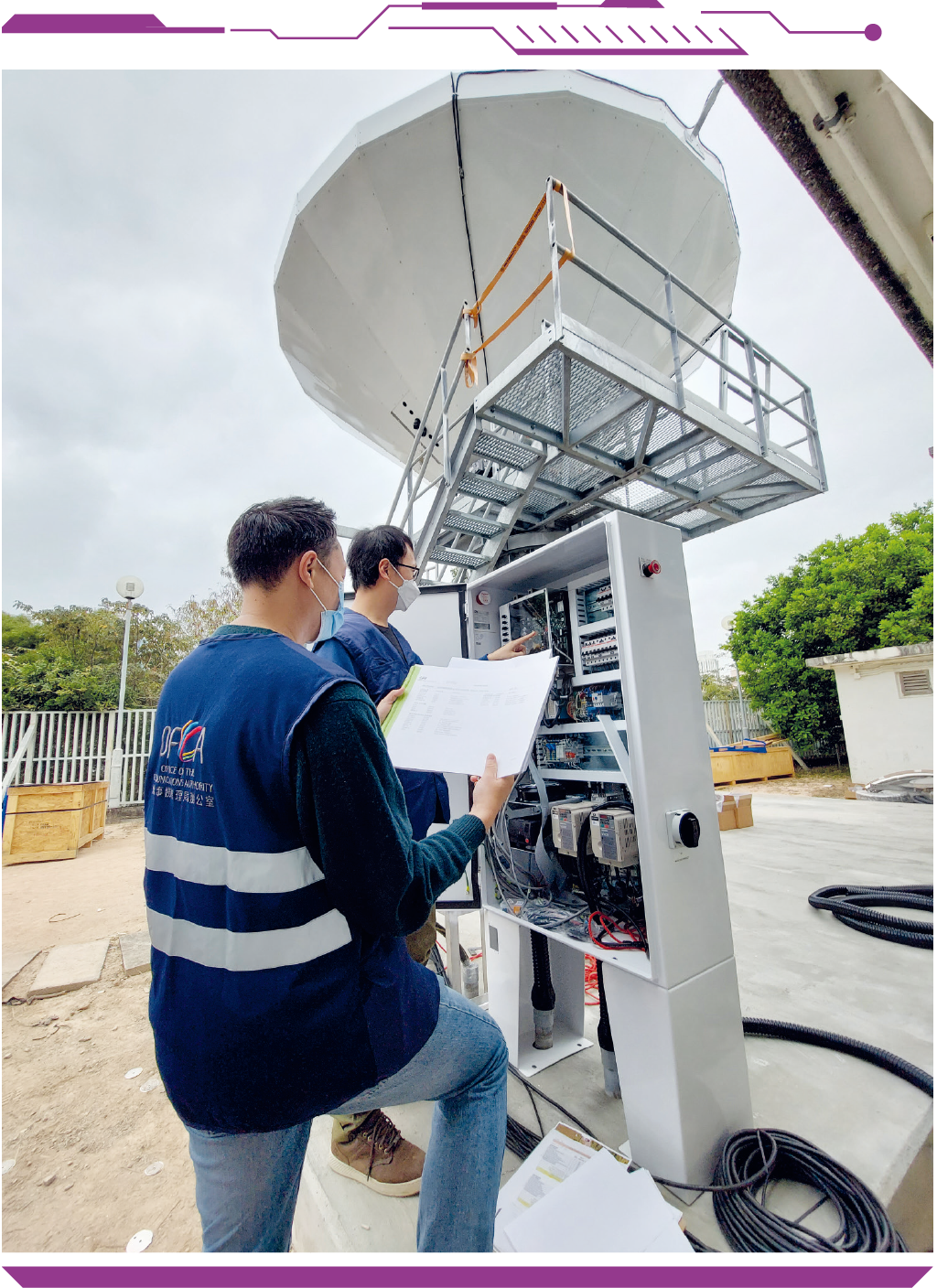
OFCA staff members are inspecting the replacement progress of the satellite broadcast monitoring system in Kwun Tong.
OFCA stays abreast of international developments in telecommunications standardisation and updates local technical standards in order to meet the needs of the industry and the public. In 2022/23, three technical standards covering several types of telecommunications equipment were revised pursuant to the Amendment Ordinance and two new technical standards governing 6 GHz devices and 5G repeater equipment were approved and issued by the CA.
Qualified local and overseas testing laboratories are now providing testing and certification services for different kinds of telecommunications equipment in accordance with technical standards prescribed by the CA. In particular, a full range of telecommunications equipment testing and certification services are offered by local laboratories accredited by the CA as local certification bodies (LCBs). In 2022/23, LCBs and foreign certification bodies issued 575 equipment certificates to meet the needs of the telecommunications equipment market.
To ensure that all LCBs providing telecommunications equipment testing and certification services meet the required service quality and performance standards, OFCA will continue to closely monitor their performance by conducting regular documentary checks, on-site visits and reviews. So far, all LCBs have complied with the requirements set by OFCA.